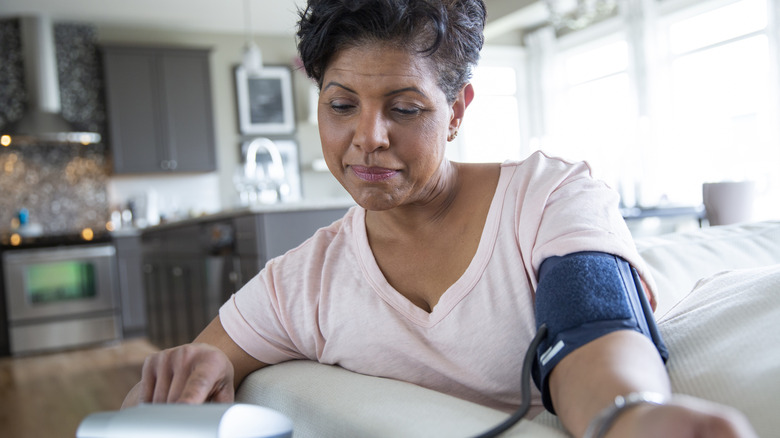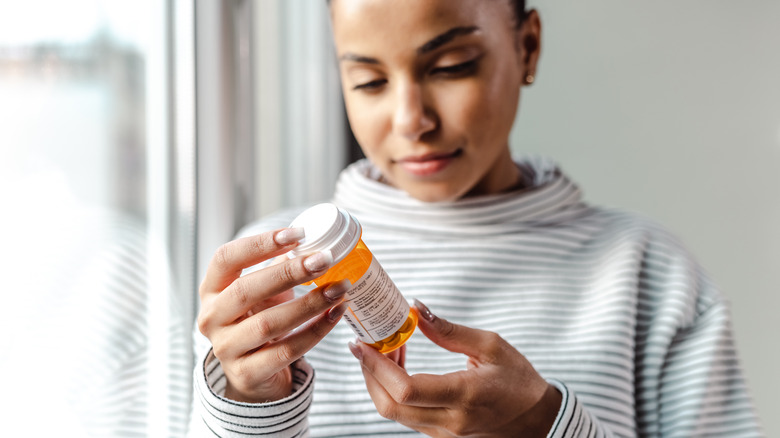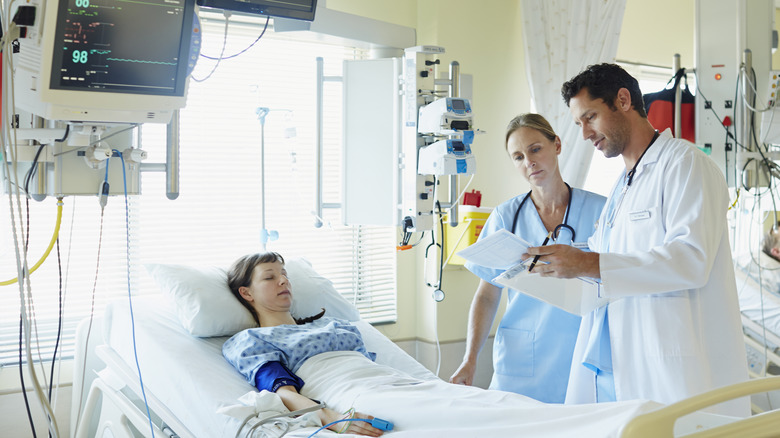The Blood Pressure Medication Mistake That Could Lead To Death
It's imperative to maintain healthy blood pressure to avoid other health issues, such as heart disease. Many individuals with high blood pressure take blood pressure medications, but they have to make sure not to take too much of them because an overdose can sometimes lead to death.
According to the American Heart Association (AHA), normal blood pressure should be less than 120 on the upper number and less than 80 on the bottom number on a blood pressure machine. The upper number, or systolic blood pressure, represents the amount of pressure on the artery walls when your heart beats. Diastolic blood pressure, determined by the bottom number, measures the pressure on the artery walls when the heart is at rest.
Medications designed to lower blood pressure are one of the most common ways to treat high blood pressure, as described by the AHA. Some classes of blood pressure medications include diuretics, beta-blockers, and alpha-blockers, as well as others. Blood pressure medications are typically used when someone has stage 1 or stage 2 of hypertension. Hypertension stage 1 is characterized by a systolic blood pressure of 130 to 139 and a diastolic blood pressure of 80 to 89. Those with hypertension stage 2 have a constant blood pressure of 140/90 mm Hg (millimeters of mercury) or higher.
Beta-blockers are a popular choice because of their ability to lower blood pressure and prolong life expectancy in people with heart failure, according to the British Heart Foundation. However, beta-blockers should be used carefully to prevent overdose.
Too much blood pressure medication can be fatal
Someone can experience an overdose if they consume a higher dose of beta-blockers than prescribed, whether by accident or on purpose, according to Mount Sinai. Depending on the drug and the amount of time it takes to receive medical care, some patients who overdose on beta-blockers can survive.
The risk of severe overdose can increase if someone has other drugs in their system, like digoxin, calcium channel blockers, and tricyclic antidepressants. Lipid-soluble beta-blockers — like propranolol, sotalol, and oxprenolol — have an increased risk of serious side effects if an overdose occurs, as explained by Medscape. People who have cardiac or pulmonary disease may also have severe reactions during a beta-blocker overdose.
Beta-blocker medications contain a poisonous ingredient that blocks the hormone epinephrine, and the exact poisonous ingredient depends on the creators of the drug. Individuals who are experiencing a beta-blocker overdose may show distinct symptoms, including shortness of breath, blurred vision, and low blood pressure. In severe overdoses, a person can experience heart failure, hallucinations, seizures, or a coma, as described by the Missouri Poison Center. Overdoses of lipid-soluble beta-blockers, especially propranolol, are more likely to trigger seizures, according to Medscape.
What happens during a beta-blocker overdose
A beta-blocker overdose can be traumatic for the person experiencing it as well as their loved ones. When someone has a beta-blocker overdose, there's a line of treatments doctors typically utilize to try and save the patient's life. First, medical professionals will focus on improving breathing and circulation, according to the NUEM Blog. Afterward, they will contact poison control for guidance about their next steps. As soon as possible after identifying a severe overdose, medical professionals will try to decontaminate the gastrointestinal tract with gastric lavage, charcoal administration, or total bowel irrigation.
High-dose glucagon is the primary treatment that medical professionals use in beta-blocker overdoses, as explained by the Missouri Poison Center. According to the Cleveland Clinic, glucagon is a hormone that regulates blood sugar levels. In cases of beta-blocker overdose, high-dose glucagon is given through an intravenous injection (IV). This treatment can raise cyclic AMP levels and stimulate cardiac contractions. A 2019 systematic review published in Clinical Toxicology discovered that other treatments can decrease mortality risk, including catecholamines, vasopressors, high-dose insulin euglycemic therapy, and veno-arterial extracorporeal membrane oxygenation.
If you're currently taking beta-blockers for high blood pressure, it's vital to only consume as much as you were prescribed. If you need help remembering if you took your medication, you can flip over your pill bottle whenever you take it, log each dose in a journal or calendar, or use a weekly pill box, as noted by Children's Mercy Kansas City.
If you or anyone you know is having suicidal thoughts, please call the National Suicide Prevention Lifeline by dialing 988 or by calling 1-800-273-TALK (8255).



